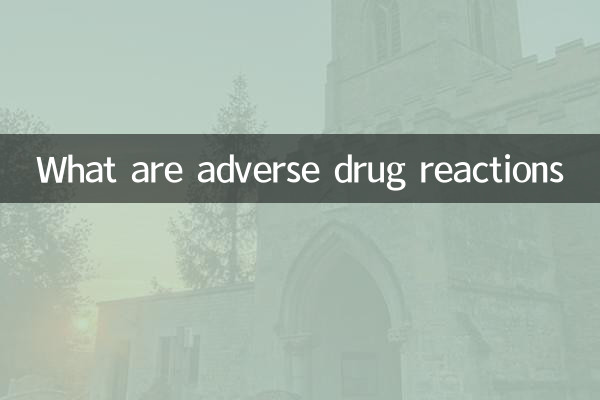What are adverse drug reactions
Adverse Drug Reaction (ADR) refers to a harmful reaction that occurs when a normal dose of a drug is used and is not related to the therapeutic purpose. These reactions may be related to the pharmacological properties of the drug, individual differences, or drug interactions. In recent years, with the increase in drug types and the expansion of drug users, adverse drug reactions have become a hot issue of global concern. The following will give you a detailed analysis from the aspects of definition, classification, common symptoms and preventive measures, combined with recent hot topics.
1. Definition and classification of adverse drug reactions

According to the definition of the World Health Organization (WHO), adverse drug reactions refer to any harmful or unexpected reaction that occurs after using normal doses of drugs when preventing, diagnosing, treating diseases, or regulating physiological functions. Adverse drug reactions usually fall into the following categories:
| Classification | Description | Example |
|---|---|---|
| Type A reaction (Augmented) | Related to drug pharmacological effects, dose-dependent | Gastrointestinal bleeding caused by aspirin |
| Type B reaction (Bizarre) | It has nothing to do with the pharmacological effects of the drug and is difficult to predict. | Penicillin allergic reaction |
| Type C reaction (Chronic) | Cumulative toxicity caused by long-term medication | Osteoporosis caused by long-term use of glucocorticoids |
| Type D reaction (Delayed) | It takes a long time to appear after taking the medicine | Secondary tumors caused by chemotherapy drugs |
2. Recent popular adverse drug reactions
In the past 10 days, adverse drug reactions that have been hotly discussed across the Internet have mainly focused on COVID-19 vaccines, weight loss drugs, antibiotics and other fields. The following are some hot topics:
| event | Drugs involved | Adverse reaction manifestations |
|---|---|---|
| COVID-19 vaccine myocarditis controversy | Pfizer/BioNTech Vaccine | Myocarditis cases increase in adolescents after vaccination |
| Side effects of the slimming drug "Ozempic" | semaglutide | Nausea, vomiting, risk of pancreatitis |
| Antibiotic resistance reports | Fluoroquinolones | Tendon rupture, neurological symptoms |
3. Common symptoms of adverse drug reactions
Adverse drug reactions can manifest in a variety of ways, ranging from mild discomfort to life-threatening. The following is a common classification of symptoms:
| system | Common symptoms |
|---|---|
| skin | Rash, itching, hives |
| digestive system | Nausea, vomiting, diarrhea, abnormal liver function |
| nervous system | Dizziness, headache, insomnia |
| cardiovascular system | Palpitations, blood pressure fluctuations, arrhythmias |
4. How to prevent adverse drug reactions?
Although adverse drug reactions are difficult to completely avoid, the risk can be significantly reduced by taking the following measures:
1.Take medication as directed by your doctor: Strictly follow the instructions of your doctor or pharmacist when taking medication, and avoid adjusting the dosage or stopping the medication on your own.
2.Get drug information: Read the drug instructions carefully before taking the medicine to understand possible side effects and contraindications.
3.Monitor body reactions: Pay attention to physical changes during medication, and seek medical attention promptly if any abnormalities occur.
4.Avoid drug interactions: Inform your doctor of other medications or supplements you are taking to avoid potential interactions.
Conclusion
Adverse drug reactions are inevitable problems in medical practice, but through scientific medication use and strict monitoring, their harm can be minimized. Recent discussions about vaccines and weight-loss drugs remind us that drug safety is always a public health concern. If you experience any discomfort during medication, please consult a medical professional in time.

check the details

check the details